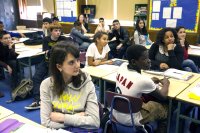Shifting Toward Equity: The Educator’s Role
Creating equity in schools means examining the systems, policies, and practices that breed inequitable outcomes.
Your content has been saved!
Go to My Saved Content.While conducting professional development or discussing issues of equity, I am often asked, “How did you become so open-minded?” The question provides a teachable moment. Fostering educational excellence requires understanding equity, embracing diverse perspectives, and countering bias that hinders inclusionary work.
Looking Within
First, take a look within. Question how you came to your current perspective. How did you learn about differences? How were you taught to view people who look different from you or do not share your beliefs?
Examine your current social contexts. Do you interact only with people who look and think like you? Do you engage with others who may have different stories, upbringings, or backgrounds?
Analyze the relationships, or lack of relationships, between you and your students or colleagues. What factors strengthen your relationships? What aspects hinder connectivity? If bias is evident, where does it come from?
It is difficult to promote identity-safe environments if you lack knowledge of your own identity. Before you formalize your thoughts about other perspectives, take a hard look at your own viewpoints and how your experiences have shaped your interpretations of others’ stories.
Identity Safety
Students want teachers to know that their identities matter. They want educational leaders to know that their racialized experiences are real. Gender-diverse students do not want their transitions to be perceived as a phase. Language learners do not want their native language to be viewed as a deficit. Religious students value practicing their faith without fear of judgment. Each student deserves an inclusive space and a person who validates their identity.
Adults are not exempt from identity-safety issues. Many adults struggle to express their identity and refrain from revealing their true self in fear of judgment. If authenticity is a challenge for you, make intentional efforts to understand where you are hesitating from fully expressing your identity, and find ways to frame your own differences as assets rather than hindrances.
Unpack and Reflect on ‘All’
In education, the word all is used to convey the importance of teaching each and every child. Our common goal is for all students to learn or show growth. But the desire for successful outcomes for all students should not make us unrealistic about the access challenges some students face.
In a “Bird Box challenge,” inspired by the recent film where the characters are blindfolded to avoid looking at supernatural beings that force them to take their own lives, individuals go through a task in their daily lives blindfolded. The challenge provides an analogy for educators’ approach to student experience. Leading inclusively requires removing the blindfold and seeing students for their authentic selves. Equity requires acknowledging student identities and the different ways they learn best. We have to meet students where they are.
Honoring the reality that all has exceptions enables educators to examine the systems, policies, and practices that breed inequitable outcomes.
Don’t Get Mad at the Messenger
When people approach you with their narrative from a place of vulnerability, listen and seek clarification. You do not need to craft a response for every situation. Sometimes people just want to be heard.
It’s important to be intentional about where attention is directed when listening to stories of injustice. Framing an inequity as a challenge to be addressed requires not criticizing the individual who makes the claim of discrimination.
A parent, student, or colleague may bring up a concern for our support, not for us to judge their disposition or emotionality while listening to their narrative. As a former principal, I observed the frustration of teachers working with families angered by the way their student’s situation was handled. It is important to take the time to unpack the why behind the anger, rather than judging or labeling the family as difficult.
Growth Mindset
The question of open-mindedness reflects an obstacle to equitable practices: the lack of a growth mindset. Educators encourage students to work through challenges daily. We want students to think critically about the world and recognize the great learning that comes with failure. The theory of learning we convey to students must be applicable in our adult lives.
Immerse yourself in diverse perspectives and voices of marginalization, making an intentional effort to seek narratives outside of your own. Build on what you learn from those you serve—students and families. Welcome feedback, conversations, and opportunities that challenge your worldview, but remember that no one owes you their story.
